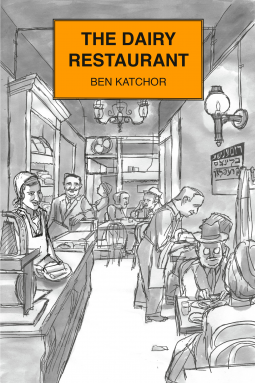Please wait... This may take a moment.
The Dairy Restaurant
This title was previously available on NetGalley and is now archived.
Pub Date
Mar 10 2020
| Archive Date
Jul 29 2022
Description
Ben Katchor retells the history of where we choose to eat—a history that starts with the first man who was allowed to enter a walled garden and encouraged by the garden's owner to enjoy its fruits. He examines the biblical milk-and-meat taboo, the first vegetarian practices, and the invention of the restaurant. Through text and drawings, Katchor illuminates the historical confluence of events and ideas that led to the development of a “milekhdike (dairy) personality” and the proliferation of dairy restaurants in America, and he recollects his own experiences in many of these iconic restaurants just before they disappeared.
PART OF THE JEWISH ENCOUNTERS SERIES
Ben Katchor retells the history of where we choose to eat—a history that starts with the first man who was allowed to enter a walled garden and encouraged by the garden's owner to enjoy its fruits...
Description
Ben Katchor retells the history of where we choose to eat—a history that starts with the first man who was allowed to enter a walled garden and encouraged by the garden's owner to enjoy its fruits. He examines the biblical milk-and-meat taboo, the first vegetarian practices, and the invention of the restaurant. Through text and drawings, Katchor illuminates the historical confluence of events and ideas that led to the development of a “milekhdike (dairy) personality” and the proliferation of dairy restaurants in America, and he recollects his own experiences in many of these iconic restaurants just before they disappeared.
PART OF THE JEWISH ENCOUNTERS SERIES
Available Editions
| EDITION |
Other Format |
| ISBN |
9780805242195 |
| PRICE |
$29.95 (USD)
|
| PAGES |
496
|
Additional Information
Available Editions
| EDITION |
Other Format |
| ISBN |
9780805242195 |
| PRICE |
$29.95 (USD)
|
| PAGES |
496
|
Average rating from 9 members
Readers who liked this book also liked:
On Loneliness
The School of Life, Julia Hawkins
Arts & Photography, Self-Help
Strangers
Belle Burden
Biographies & Memoirs, Nonfiction (Adult)
The Flower Bearers
Rachel Eliza Griffiths
Biographies & Memoirs, Parenting, Families, Relationships
Sisters in Yellow
Mieko Kawakami
Literary Fiction, Mystery & Thrillers, Women's Fiction



















